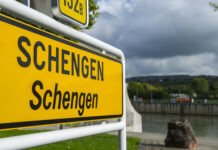As of Thursday, April 22, 2010, Bosnia and Herzegovina is a member of the Membership Action Plan. If translated to the European Union vocabulary, it means that BiH became a candidate for a full-fledged NATO member
This decision coincides with the 11th anniversary of MAP creation at the NATO summit in Washington in April 1999. MAP aims to help prepare countries that strive to become a full NATO member. Since then, Slovenia, Slovakia, Bulgaria, Romania, Albania, Croatia, Estonia, Lithuania, and Latvia have gone through this mechanism, and these countries are now successful full-fledged NATO members. In addition to BiH, Montenegro and Macedonia are currently using this mechanism to prepare for membership.
Married to NATO
A basic cooperation mechanism is used through so called Annual National Plan (ANP), which is created by a MAP country to prepare and adjust to future membership. The ANP is a comprehensive plan which covers political, economic, defense, security and legal aspects of the country’s adjustment to conditions and standards necessary for a full and, even more importantly, equal membership in MAP.
The ANP is introduced to permanent representatives of the NATO member countries for their approval. After ANP is approved, a very intense and interactive relation between the MAP country and NATO begins in order to implement plans outlined in ANP. ANP is reviewed and approved at the beginning of September of the current year and is valid for the next 12 months. A year after being approved, the permanent NATO representatives, in an open and very direct communication, analyze the level to which the ANP conditions are met. Finally, the ANP is accepted, and the country starts another one-year cycle.
It should be noted that the Partnership for Peace (PfP) country’s cooperation (such as BiH since recently) is compared to “honeymoon” with NATO, whereas the NATO-MAP relation is closer to the “marital life.”
The decision made by NATO countries’ foreign ministers in Tallinn on April 22 to invite BiH to MAP, under condition that permanent representatives will confirm the ANP once when the perspective military assets are transferred and registered as state’s property, has to be seen from various different aspects, including:
Firstly, Bosnia and Herzegovina has become a MAP member.
Secondly, BiH will not be able to start using MAP mechanisms unless it resolves the registration of perspective military assets.
Thirdly, BiH is currently cooperating with NAT O within the Individual Partnership Action Plan (IPAP). When a country enters MAP, IPAP should be replaced by ANP. It has never happened that a country joins MAP without having ANP. It means that, in our case, BiH either should meet the condition that is left to join MAP fully, or find a new, ad hoc solution for the continued BiH-NATO relation in new circumstances.
Fourthly, if BiH does not meet the above mentioned condition, as of June 2010 it is possible to have a country in MAP without having any mechanism in place which would help adjust that country to fully prepare for NATO membership – again, something that has never happened before.
Fifthly, such NATO decision reflects a compromise reached by its members. The compromise was reached among the countries which advocated an unconditional admission to MAP, taking geostrategic arguments into account, on one hand, and on the other hand, the countries which asked that BiH meets all conditions before it joins MAP, as they wanted to make sure that a continued credibility of the Euro-Atlantic partnership and progress towards NATO is secured, on the basis of reform processes results.
The decision that NATO made is highly favorable for BiH, because it maintains the dynamics of the NATO integration agreement. The decision is a result of predomination of geostrategic effects that BiH’s admission to MAP will produce in terms of country’s stability and in the region, subsequently. It is important to note that this position was advocated by all NATO member countries from Central, Southern, and Eastern Europe.
Sixthly, the scenario which was very present and which foresaw that NATO would not invite BiH to MAP at the meeting in Tallinn because the country failed to meet the conditions, included the assumption that a new opportunity for making a decision would be either in April 2011, at the next informal NATO meeting, or in December 2011, when an official meeting of NATO countries foreign ministers is planned. April of 2011 has been questionable as it was presumed that the new-formed government, after general elections in BiH in 2010, would not have been able to meet conditions that are left in such a short period of time.
Therefore December 2011 was seen as the most certain and realistic chance to make a new decision on the admission to MAP. Such development would have lead to MAP implementation starting only in September 2012, which made NATO countries from the region especially unhappy. They emphasized that, with such dynamics, BiH would lag significantly not only in Euro-Atlantic integration, but consequently, in European integration. All of this could produce negative effects on the overall stability in the whole Southeast European region.
Seventhly, this decision confirms NATO’s “open door policy” based on an individual approach, where the speed of approaching full membership is measured by the results of the reform process (performance based approach).
Eighthly, with this decision, NATO reaffirms its repeated commitment that all Western Balkans countries will be members of European and Euro-Atlantic integration when the conditions are met.
Danger of failed implementation
Ninthly, NATO was able to make this decision only after the BiH authorities make several political decision which enabled the country to meet conditions imposed by NATO. These decisions are related to destruction of surpluses of unstable ammunition and weaponry, and to sending a BiH military unit to Afghanistan. This is a proof that BiH authorities should make necessary decisions with more courage to accelerate the whole process of approaching European and Euro-Atlantic integration.
Tenthly, if it fails to meet the last condition, BiH’s credibility abroad would be significantly undermined. BiH should meet this last condition without procrastination so that it can continue its integration to NATO. A scenario that includes further politization, without resolving the issue of the imovable perspective military property, and consequently, failure to start the first MAP cycle in September 2010 is simply unacceptable for everyone who has good intentions towards all BiH citizens.
(By: Atlantic Initiative Expert Team)







